Scratch Cosmic Chicken Original Design / Scratch Built
Scratch - Cosmic Chicken {Scratch}
Contributed by Chan Stevens
| Manufacturer: | Scratch |
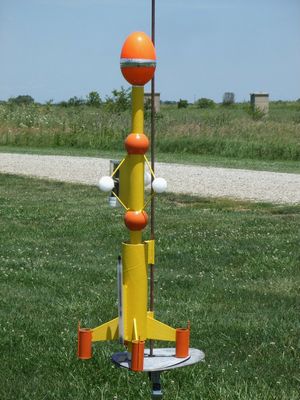
Brief:
I have to admit, a key motivator for my entry in the Box O' Parts contest this year was simply an excuse to get rid
of some stray rocketry junk, some of which was leftover from last year's contest. I gleefully tossed some interesting
doodads and a fair amount of stuff that I'd accumulated over the years with simply no hope of ever using, anticipating
I'd come out ahead on the swap. Of course, I also procrastinated and didn't bother entering until just before the
deadline, only to learn that no swap partner was available and I'd be stuck building my own stuff. On top of that, my
bonus/surprise items included a foam egg carton/cell, 10 toothpicks, dental floss, a stick pen and a pill bottle.
Yikes!
Construction:
I then went into immediate and hardcore procrastination mode again, not even thinking about the model until the week
of the revised deadline. Thank goodness my plant closed down, eliminating my job, or else I would never have had time
to put together a decent model!
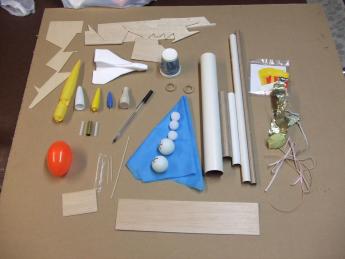 As I stared at my box of parts, the pressure of the deadline was sufficient to spark just a touch of
inspiration, and I decided I'd have to involve some type of egg-lofting payloader. The concept quickly emerged of an
alien "ark", whose mission would be to colonize a distant planet by dropping an egg with a new life forming
within. These are self-reproducing aliens of course, so I would only need to carry and deploy one egg, not two. I then
went about the process of building a carrier vessel worthy of hauling an egg across the galaxies. Or at least as far as
I could get on an 18mm motor.
As I stared at my box of parts, the pressure of the deadline was sufficient to spark just a touch of
inspiration, and I decided I'd have to involve some type of egg-lofting payloader. The concept quickly emerged of an
alien "ark", whose mission would be to colonize a distant planet by dropping an egg with a new life forming
within. These are self-reproducing aliens of course, so I would only need to carry and deploy one egg, not two. I then
went about the process of building a carrier vessel worthy of hauling an egg across the galaxies. Or at least as far as
I could get on an 18mm motor.
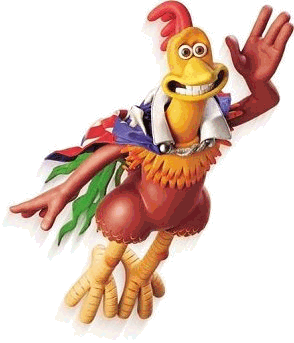 The parts list I wound up using included:
The parts list I wound up using included:
- BT-20 cut to 17" length
- 2 CR 50/20 centering rings
- 2 parachutes (12" plastic)
- Kevlar and elastic shock cords
- BT-60 cut to 6"
- 7 3/32" balsa spacers 10.5mm x 50mm (these aliens use both metric and imperial dimensions)
- BT-50 cut to 3.5"
- 2 ping pong balls
- 3 Styrofoam balls (1" diameter)
- 1 large plastic Easter egg
- 3/32" balsa fin set (see pattern 1)
- 3/32" balsa tube support (see pattern 2)
- 3/32" balsa harpoon support (see pattern 3)
- 4 BT-20 pods cut to 43mm length
- BT-20 cut to 1" length for coupler use
- 10 toothpicks
- 10" dental floss
- 1 Bic/Papermate pen
- 1 pill bottle
- 2 egg carton cell halves (enough to hold one egg)
- 2 3/16" launch lugs 1.5" length
- 2 3/32 balsa standoffs 0.5 x 1.5"
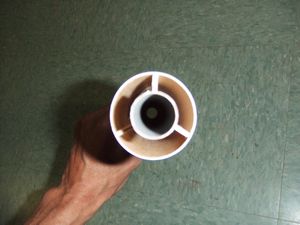
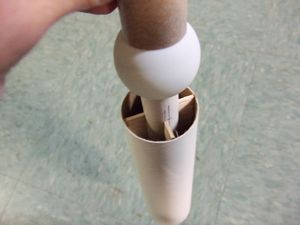
Building forward along the airframe now, I measured off on the BT-20 1 inch forward of the BT-60. I grabbed one of the ping pong balls and using the technique from many a Shrox design (ex. Fliskits Alien 8), cored out a 19mm hole on opposing "ends" of the ball. To do this, simply press the end of a BT-20 against the ball, trace around the joint with the ball, then using a sharp hobby knife score the marked line several times. Eventually you'll start to cut through the ball. Sand smooth so that the tube just barely fits through, then push the tube all the way through until it's touching the opposite wall. You might have to hold the ball up to a bright light at this point to see, but there will be a shadow against the surface where the BT-20 wants to come through. Mark that circle, remove the BT-20, and repeat the scoring/cutting process. Voila! You now have a ping pong ball that can slide down a BT-20. Apply a generous bead of glue on the main BT-20 at the mark 1" forward of the BT-60 and slide the ping pong ball down until it just reaches this point. Once the glue has set, apply a small fillet to the other end. Grab another ping pong ball and core it out for another BT-20 hole, but set it aside.
Once the first ball's glue joints have grabbed, take the 3.5" BT-50 and slide it down the main BT-20. No centering rings will be necessary, as the ping pong balls will hold it in place. Take the other ping pong ball, slide it down the BT-20 and press it against the BT-50, wedging it in place against the first ball. Now apply a bead of CA around the forward seam of the second ball so that it grabs quickly and frees up your hands. Follow up with white glue fillets around the BT-50/ping pong ball seams.
I now grabbed the large plastic Easter egg capsule. I wanted to use this as the egg carrier and nose cone, but needed a piece of coupler stock to do this. Since I didn't have any, I cut a 1" length of BT-20 to make a coupler. This little trick comes in handy, especially doing field rework in NAR contests—I made a vertical cut along the tube, then pinched on end under/inside the other, and pushed this into the end of the main BT-20, leaving about 1/4" exposed. I took a pencil and made a mark at the overlap point. I then pulled this back out of the main BT-20, extended the mark along the length of the coupler piece, and cut along that line, removing a tiny section of the tube. This section then becomes an overlap tab. I tacked it to the inside of the coupler piece with half the tab exposed beyond the cut line. Once that set, I tacked the other side to the overlap tab forming a butt joint (see photo). The result is a perfect-fitting coupler.
The egg capsule is a bit larger than most eggs, so to protect the egg I used two halves of egg cells from an egg carton, plus a little dog barf padding. I used Mylar tape to seal the two capsule halves together, though plain old masking tape or electrical tape would work fine as well, just not look as nice.
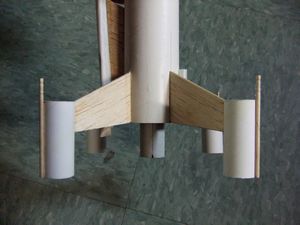
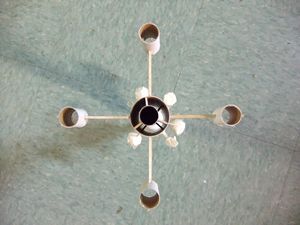
I wanted to dress up the middle of the rocket as well as use up more stuff, so selected 6 toothpicks and the 3 Styrofoam balls. I inserted 2 toothpicks into each ball at roughly 90 degree angle, and adjusted the depth a bit to line up with the joints where the BT-50 meets the ping pong balls (see photo). I tacked each assembly in pace with CA, mounting them in alignment with the 3-fin markings from the BT-20 (marking the BT-50 for 3-fin and aligning the marks with the BT-20 would probably have been smart, but that would be out of character for me).
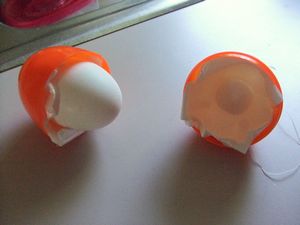
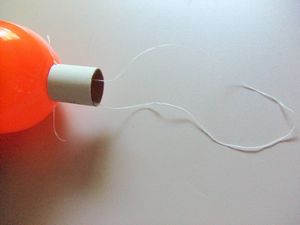
At this point, I was ready to mix up a small batch of epoxy. I went with 15-minute regular hobby grade (the thick stuff that sort of oozes out). I grabbed some dental floss to use as a shock cord for the egg capsule, tied a couple knots in each end, and then taped each end to an opposing side of the coupler, with the resulting loop pushed out what will be the aft end of the coupler (see photo). I applied a generous bead of epoxy along the inside and forward edge of the coupler, then attached it to the bottom of the egg capsule, trapping the floss in between with the knots outside. I set that assembly aside to cure out.
I then hit each of the toothpick/BT-50 joints with a drop of epoxy to reinforce them.
I cut out a series of fins and support pieces, each of which are shown in the pattern photos. The 4 main fins are mounted flush with the aft end. Each of these has a 43mm long piece of BT-20 attached, with the end of the BT-20 flush with the forward edge of the fin tip. If aligned correctly, these should extend just far enough behind the fin to be flush with the motor tube when stood on end. To fill my quota of 10 toothpicks for the surprise parts bonus, I attached one toothpick to each of the 4 pods, serving as little guns to defend against hostiles en route.
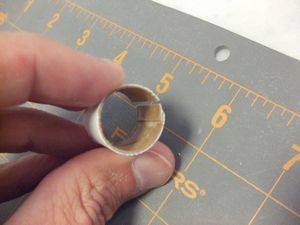
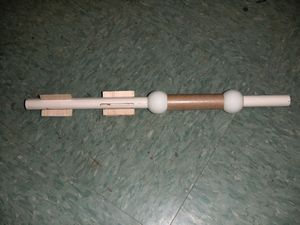
I still had a couple more bonus items to use up, so attached a pill bottle to a 3/32 balsa brace and tacked this onto the BT-50, with the open end of the capsule facing rearward. My capsule was 2.5" long, just barely big enough to house a Pico altimeter, so I drilled a tiny hole so that it could serve as a working payload bay.
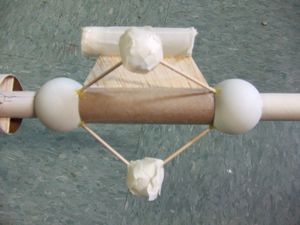
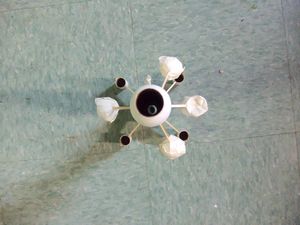
I had to work in a stick pen somehow, so decided to up the armaments a bit and rig a harpoon, perfect for hooking on to a passing comet or taking care of any cosmic whales encountered along the way. I mounted the pen using another 3/32 support. Note that this could also serve as a working payload, simply by removing the rear plug, inserting a Micromaxx motor, and loosening the pen cartridge slightly. Just be careful mounting this, as you don't want to deploy the harpoon into the back of one of the Styrofoam balls. I aligned mine flush with the aft end of the BT-20.
Normally, I wind up forgetting about basic stuff like launch lugs and recovery until I get to the field, but for a change of pace decided to take care of that before painting. I attached a couple of 3/16 lugs to the BT-60, just clearing the ping pong balls. As I was getting ready to head to the field, I recognized I had still goofed—the lugs would not clear the egg capsule. Easy enough to correct—I sliced them off, cut a couple of standoffs (1/2" x 1.5") from 3/32 balsa, and tacked them back on.
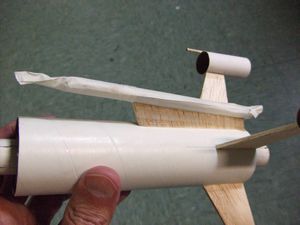
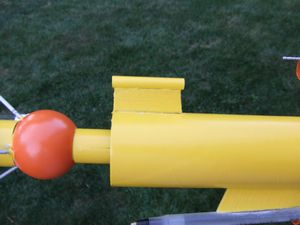
For the recovery, I only had 12" chutes to work with, so attached one to the dental floss for the egg capsule, and the other to the main BT-20 using Kevlar and elastic anchored to a 50/20 centering ring inserted about 6" down from the forward end of the tube.
Finishing:
Before painting, I masked off the foam balls (most paints will attack and eat the foam), the pill bottle and the
pen/harpoon. I then hit the whole thing up with two coats of white primer, followed by two coats of yellow. I then
masked off for the accent orange areas, and hand painted the details.
While decals are not allowed for the contest, I did find a cool piece of clip art I eventually will add to the décor, which is included in the attachment upload for this write-up.
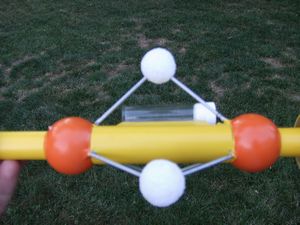
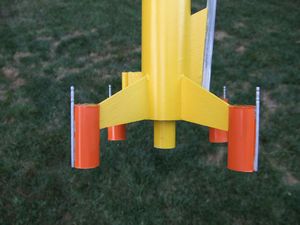
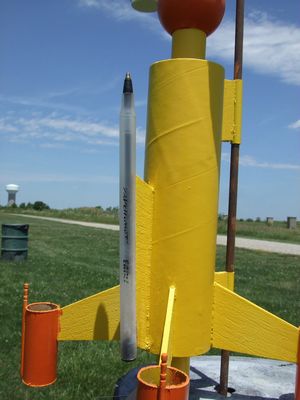
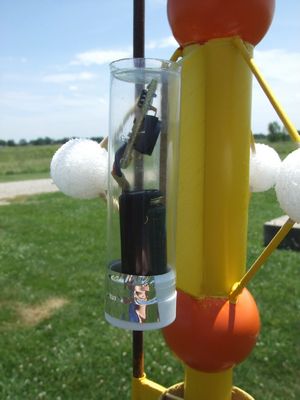
Flight:
For the flight, I was down to about the last day before the deadline, so had to take whatever weather I could get. I
caught a gorgeous day and headed out to the field, though by the time I got there the winds were pretty
stiff—steady at 10 gusting to 15. Egg lofters tend to be overly stable, and strong winds typically
means bad news. Still, being the steely-eyed missile man that I am, I loaded up a C6-3 and hoped for the best.
The flight, as expected, started to turn into the wind almost as soon as it left the rod, but despite all the do-dads this is really pretty light and not too draggy, so the C6 did a fair job of pushing it. I suspect if I'd gone off a piston, it might even have held a nearly vertical path. As it was, it did eventually lean into a horizontal path, so even the 3 second delay was well past apogee. Both chutes deployed at around 100 feet, and the rocket drifted back to within 20 yards of the pad after having crossed the soccer field during boost. The egg survived nicely, but one of the toothpicks holding a foam ball broke loose on impact, leaving me with a pretty simple repair.
I did wind up loading the Pico altimeter for the flight, which reported an apogee of 228 feet. On a calmer day, this would clearly have made it to 300+, which is actually pretty respectable for an egg lofter made of leftover junk.
While the 228 feet is not likely enough distance to support colonization of a distant plant, with minor improvements in propulsion technology, maybe a little antimatter drive, the Cosmic Chicken would appear to be fully capable of transporting life forms across galaxies.
Sponsored Ads
 |
 |











